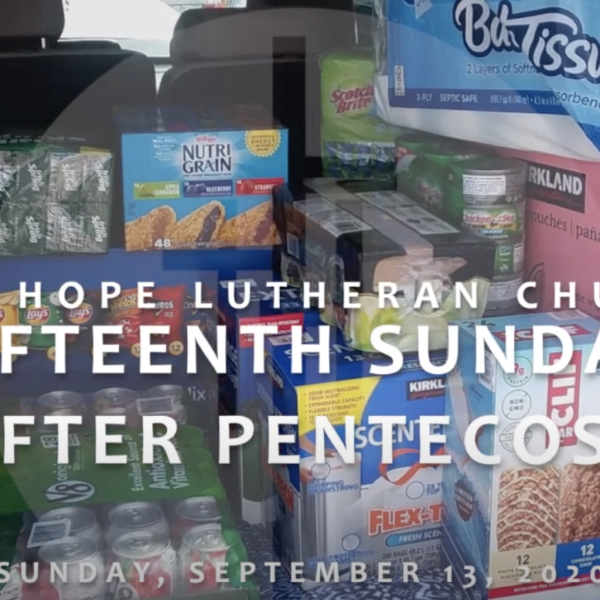Fifteenth Sunday after Pentecost 2020
Matthew 18:21-35
21 Peter came and said to Jesus, “Lord, if another member of the church sins against me, how often should I forgive? As many as seven times?” 22 Jesus said to Peter, “Not seven times, but, I tell you, seventy-seven times.
23 “For this reason, the kingdom of heaven may be compared to a king who wished to settle accounts with his slaves. 24 When the king began the reckoning, one slave who owed him ten thousand talents was brought to him; 25 and, as the slave could not pay, the lord ordered him to be sold, together with his wife and children and all his possessions, and payment to be made. 26 So the slave fell on his knees before the king, saying, ‘Have patience with me, and I will pay you everything.’ 27 And out of pity for him, the lord of that slave released him and forgave him the debt.
28 But that same slave, as he went out, came upon one of his fellow slaves who owed him a hundred denarii; and seizing him by the throat, said, ‘Pay me what you owe.’ 29 Then his fellow slave fell down and pleaded with him, ‘Have patience with me, and I will pay you.’ 30 But the slave refused; then he went and threw him into prison until he would pay the debt. 31 When his fellow slaves saw what had happened, they were greatly distressed, and they went and reported to their lord all that had taken place. 32 Then his lord summoned the slave and said to him, ‘You wicked slave! I forgave you all that debt because you pleaded with me. 33 Should you not have had mercy on your fellow slave, as I had mercy on you?’ 34 And in anger his lord handed him over to be tortured until he would pay his entire debt. 35 So God will also do to every one of you if you do not forgive your sibling from your heart.”
—————
Please pray with me this morning, church:
Loving God,
Though undeserved,
We live in awe of your love and mercy.
We thank you for your
Inexhaustible well of forgiveness.
Make us bold,
To show that same forgiveness, mercy, and love
To our neighbors, and to a hurting world.
Amen.
—————
13 months into this whole child-raising thing, and we’re finding there are a lot more rules in our house than previously. And they’re things that, like, we wouldn’t have necessarily thought we needed a rule for 13 months ago, but now here we are. Things like, “Don’t eat the cat food.” We didn’t know we needed that rule, we just thought it was, like, an understood thing. The cat eats the cat food. Cat food is not for humans. But now we have a rule for it.
And the following of all these new rules is……*hmmm*…inconsistent, to say the least… Ok, so like, the new rules aren’t really followed and usually, our house is filled with a lot of: “No…” “Don’t do that…” “Don’t put that in your mouth…” “Seriously, don’t put that in your mouth…” “Get that out of your mouth!”
We’re still working on what the word “No” means.
But there’s a particular rule that’s been around for about 10 years now. It’s one of our oldest family rules…
The rule is No Scoreboarding.
And just to be upfront about it…I’m not very good at this rule.
And it’s my rule.
And it’s one of the big things I talk about when I do pre-marital counseling with folks.
And I still do it.
I still break this rule.
All the time.
The concept is simple. Scoreboarding is when you mentally try and keep track of who does what so you can figure out who does more work around the house. I washed the dishes, so you do the laundry. I mowed the lawn, so you clean the shower. Stuff like that.
Scoreboarding is one of the least helpful things for relationships because no matter how earnestly you try to keep score and keep track of who does what and for how long, you will always come up short. Guaranteed. Without fail.
Your partner will always have done more that you didn’t see and you’ll have been holding onto this grudge and you will have let it nag at you and eat at you, and it will have literally rotted you out from within and it will externalize itself in this really nasty encounter where you argue about who does what and everyone will get mad and it’s really unhealthy for relationships…
I told you…I break this rule all the time.
The thing about scoreboarding and why it’s so unhealthy is because you can’t do it. You can’t keep track of everything and who does what and for how long. Scoreboarding becomes the thing you obsess over, and you’re so worried about trying to take note of who’s doing what that you’ll miss all the opportunities to be a loving and caring partner because you won’t be looking for those opportunities.
It’s literally one of the biggest things I tell couples in our pre-marital counseling sessions…and I still do it…
It reminds me of Peter’s question in our gospel this morning: “How many times should I forgive someone, Lord?” Peter’s looking for something quantifiable here. Peter wants to know what the limits are on forgiveness.
“What if someone’s wronged me and I forgive them 7 times? Is that enough, Jesus? Surely by the 7th chance, I should be out of chances to give, right?”
“Not 7 times, Peter…but 70 times 7…” Or 77 times. The Greek is a little fuzzy.
The point is, it’s a lot. You wouldn’t be able to keep track.
You’d lose count.
You and I do this too, though, right?
You and I want to know the limits on things.
How much do I have to love my neighbor? What are the boundaries of God’s justice? How many chances do I give someone? How far does God’s grace extend? Is everyone really welcome? How many times do I have to be confronted with hearing about injustice?
You and I want to know the limits.
You and I want to be able to keep score so we know when we can start withholding from others.
You and I don’t want to recognize or acknowledge the grace, mercy, and love that we’ve been shown by God and by others so that we can fool ourselves into thinking that there are those who should be required to live outside of God’s grace, and mercy, and love…outside of the grace, and mercy, and love that should be shown by us…that God requires of us.
You and I want to fool ourselves into believing that God is just as vindictive and just as revenge-seeking as we are!
You and I want to know the score.
Or more accurately, you and I want to know the other person’s score…while failing to look at our own…
“Physician, cure thyself!” Jesus would say in Luke.
Or maybe more pointedly, from earlier in the Gospel of Matthew, “Why are you obsessed with a speck of dust in your sibling’s eye, without considering the plank in your own eye?”
In this way, you and I are much more like the unforgiving slave than we are the king in Jesus’ parable. We’ll gladly take God’s forgiveness and love freely given to us, but we expect others to earn it, don’t we? Like our Confession from the beginning of the service says, “We keep your gift of salvation for ourselves.”
We expect others to earn it.
Truly a double standard.
In response to Peter’s scoreboarding, Jesus tells the disciples a parable that begins, “The kingdom of heaven may be compared to…” And ends with another example of why I’m so vehement that the gospel writers would have kept their own opinions out of Jesus’ words, but nonetheless, ends with, “So the king handed the servant over to be tortured until he would pay his entire debt. So God will also do to every one of you if you do not forgive your sibling from your heart.” Which sounds nothing like the character of God we’ve come to know.
Because the truth is, if you’ve ever experienced the radical forgiveness of God…and all of you should be raising your hands now…if you’ve ever experienced the radical forgiveness of God, you’ll know that the weight of the debt is nothing compared to freedom felt by being forgiven of that debt.
Which is why we’re the ones then charged with extending that same mercy and forgiveness and love to a hurting world. “God’s work. Our hands.” As we celebrate today. We’re the ones through whom God does God’s work in the world. We’re the ones freed in Christ to love and serve our neighbor and to work for justice on their behalf.
Because you have been shown. You have been freed.
You have been shown mercy and love and forgiveness.
The truth is, you know that there always seems to be enough of God’s forgiveness to cover your mess-ups.
And thank God…because if it were only 7 times, Peter would have used almost half just a few short months later in the courtyard of the temple. “I told you…I’ve never met the guy…” 3 times.
To which, suddenly a rooster crows and instantly Peter remembers and maybe recalls this very conversation. Peter…whose response to this realization is to run out of the courtyard and weep bitterly.
Sometimes the forgiveness we truly need is the permission to forgive ourselves.
For all those times we keep messing up.
For all those times we hold others do a different standard than ourselves.
For all those times we want to place a limit on whom God’s love and grace and mercy is for.
Thank God we can’t keep track.
Thank God the number would be too high.
I think it would break the scoreboard.

